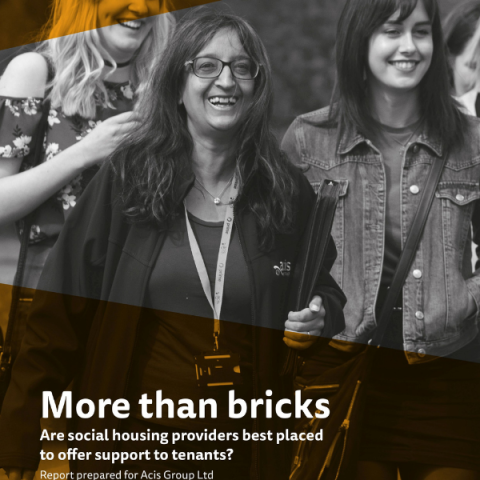More than bricks
Social housing providers should take a lead in delivering support packages to help people overcome barriers in their lives, according to our More than bricks report.
The report argues that many social housing tenants are struggling to find the help they need, and social housing providers are best placed to provide such support.
Following a survey of 250 social housing tenants and 21 social housing professionals, More than bricks found that:

- Social housing providers are already offering a wide range of support services, including those aimed at benefits and budgeting, health and wellbeing and various types of skills training
- However, the majority of providers (60%) said there was demand for greater levels of support currently not catered for, particularly around specific vocational training, digital support and mental health
- More than 90% of organisations stated their support services had been impacted by funding cuts over the last three to five years, while the majority cited mostly negative expectations towards the future funding of support over the next three to five years
- A third of tenants say they would not know where to go to receive support if they needed it
- Acis Chief Executive Greg Bacon said: “It is undoubtedly a challenging time for social housing providers. We know many providers have reduced or even halted the amount of support services they offer to tenants. But our report is showing the demand for these services is great – and the sector is best placed to provide it
“At the same time, we cannot work in silos. We all need join forces, with social housing providers at the centre using our unique level of access, to build up extensive networks to address the issues that are affecting our customers’ lives.”
We believe we are one of the organisations leading the way in this area, helping to increase tenancy sustainment and, in turn, customer satisfaction. Following extensive insight from customers and analysis of the data, including anecdotal, of the issues affecting customers, we launched our own support package, featuring a new assessment process to help the organisation identify needs much earlier.
In a period between February-November 2017, 557 customer assessments were carried out. As a result of these assessments, 271 (49%) customers were found to have some level of support needs.
Some 107 (39%) cases of the 271 needed a high level of support so they were referred into our Supporting Foundations service – a bespoke and personalised service aimed at improving the situations of individuals concerned. Going further, 122 referrals to external agencies have been made to get more intensive advice and support.
We believe this support is, directly or indirectly, leading to the length of tenancies increasing. The following year has seen the average length of tenancies had increase by 17 weeks – almost four months. And although there are many other factors to include, tenancy arrears reduced by 14%.
The report makes a series of recommendations to social housing providers and government, including:
- Social housing providers should consider more consortia or joint venture arrangements to encourage effective collaboration to develop support programmes
- The government should identify support services as a component of the regulatory framework, ensuring activity is reported on within annual reports
- The government should define a clear and consistent measure for support services to help demonstrate specific outcomes
- The government should make it a mandatory requirement that housing associations be on frameworks for bidding opportunities on wider support service tenders
